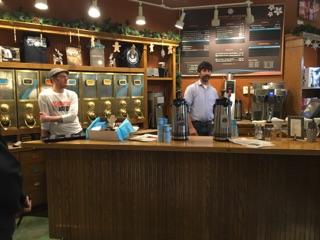photo courtesy of Tess Macsiz
What is it that we taste when we sip our coffee? Is it the soil or environmental factors of an area? The varietal? Is it the wash/fermentation process? Or the hand of the roaster? From our field study work it would seem that many people in the coffee roasting industry would like you to think that it is the roasters who are imbuing these beans with magical flavors. And to a certain extent that would be true. Just as a wine maker or chocolatier plays an integral role in terroirs ultimate role in a product, so to does a roaster. As a result of everything we have learned throughout this quarter, I can say with assurance that yes I can taste the differences in the terroir of different coffees. I take my sip and say “hmm this coffee smells & tastes great, the coffee roaster sure brought out some wonderful flavor and aromatic profiles.” And for me its important to recognize and emphasize BROUGHT OUT, for the coffee roaster didn’t create the flavors, they simply gave the coffee bean a nudge in the right direction.
by, GT

